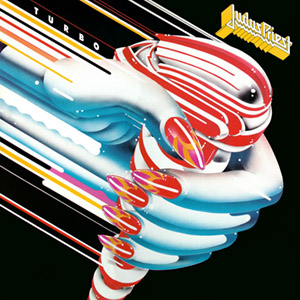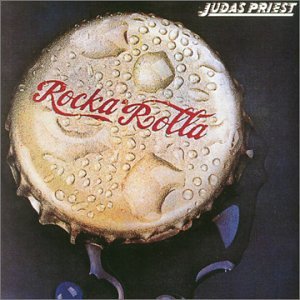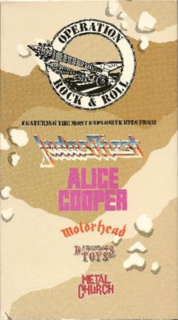
Turbo is the tenth studio album by British heavy metal band Judas Priest, released by Columbia on 14 April 1986. A remastered CD was released in 2001, including two bonus tracks. A 30th anniversary edition, released on 3 February 2017 titled Turbo 30, contains 3 CDs which features the album plus 2 CDs of a live recorded performance at Sandstone Amphitheater near Kansas City, Missouri, on 22 May 1986. The album marked the band's first use of guitar synthesizers.
David Holland was an English heavy metal drummer born in Northampton, England, best remembered for his stints with Trapeze from 1969 to 1979 and Judas Priest from 1979 to 1989.

Stained Class is the fourth studio album by British heavy metal band Judas Priest, released in February 1978. It is the first of three albums to feature drummer Les Binks, as well as their first to feature their well-known logo. It gained notoriety for its dark lyrics and themes, as well as a 1990 civil action trial where the band were accused of backmasking that allegedly led to the suicide attempts of two teenagers. Stained Class was ranked as the greatest Judas Priest album on Stereogum.com, and was described by Steve Huey on Allmusic.com as "Judas Priest's greatest achievement".

Rocka Rolla is the debut studio album by British heavy metal band Judas Priest, released on 6 September 1974 by Gull Records. It was produced by Rodger Bain, who had made a name for himself as the producer of Black Sabbath's first three albums. It is the only album to feature drummer John Hinch.

Sin After Sin is the third studio album by English heavy metal band Judas Priest, released in 1977. The album represented several major milestones in the group's career; the band made their major label debut and were able to work with a famous musical artist as their producer, former Deep Purple member Roger Glover. The band also fully embraced an aggressive metal sound with this release, significantly toning down the arena rock and blues rock influences shown in their past work. The group achieved widespread popularity on the radio stations for their first time, oddly enough with their hard-edged version of Joan Baez's song "Diamonds & Rust". It is the only Judas Priest album to feature drummer Simon Phillips, a studio drummer who replaced Alan Moore.
The World Wide Blitz Tour was a 1981 concert tour by British heavy metal band Judas Priest where the band toured in Europe and North America from 13 February to 14 December 1981 in support of the album Point of Entry.
The Mercenaries of Metal Tour was a 1988 concert tour by British heavy metal band Judas Priest, in support of their most recent release, Ram It Down. Unlike their other tours of the 1980s, no official Judas Priest release includes any live recordings from this tour. It was the final tour the band did with longtime drummer Dave Holland. The week before the tour started, the band visited Stockholm, Sweden for full production rehearsals at Hovet. Before the official tour start, the band played a few warm-up shows including one in a club in Amsterdam, Netherlands in early April 1988, where the footage for the Johnny B. Goode video was shot.
The Whiskey Woman Tour was a concert tour by British heavy metal band Judas Priest. It ran from 1 January 1972 until 9 January 1973 through England, Scotland, Wales and a date at the Isle of Man.
The Rocka Rolla Tour was a concert tour by British heavy metal band Judas Priest which was in support of their debut album Rocka Rolla. It ran from 10 September 1974 until 28 December 1975. This would be the band's first international tour as they made their first European visit to Denmark, Sweden, the Netherlands and Norway.
The Sad Wings of Destiny Tour was a 1976 concert tour by British heavy metal band Judas Priest which was in support of the album Sad Wings of Destiny. It ran from 25 March 1976 until 27 May 1976 through England.
The Sin After Sin Tour was a 1977 concert tour by British heavy metal band Judas Priest which was in support of their album Sin After Sin. It ran from 22 April until 24 July 1977 venturing through England with a date in Wales plus making their first time visit in the United States.
The Stained Class Tour was a 1978 concert tour by British heavy metal band Judas Priest where they toured in Europe, North America and Asia for the first time from 19 January to 5 August 1978 in support of the album Stained Class.
The World Vengeance Tour was a 1982 concert tour by British heavy metal band Judas Priest where they toured throughout North America from 26 August 1982 until 21 February 1983 in support of the 1982 album Screaming for Vengeance.
The Metal Conqueror Tour was a concert tour by British heavy metal band Judas Priest in support of the album Defenders of the Faith. It ran from 20 January until 13 September 1984.
The Painkiller Tour was a concert tour by British heavy metal band Judas Priest which was in support of the album Painkiller. It ran from 18 October 1990 until 15 April 1991.

Operation Rock & Roll was a 1991 concert tour featuring Judas Priest, Alice Cooper, Motörhead, Dangerous Toys and Metal Church. It ran from 9 July 1991 until 19 August 1991 in the United States and Canada. This tour was in honor of the US forces involved in Operation Desert Storm during the Gulf War. This would also be Judas Priest's final tour with Rob Halford until 2004.

The Reunited Tour was a 2004 concert tour by British heavy metal band Judas Priest. It ran from 2 June 2004 until 2 September 2004. This tour celebrated the return of Rob Halford since his departure in 1992, replacing vocalist Tim "Ripper" Owens. The band also began performing in E♭ tuning during this tour, which would since be their primary sound.
The Firepower World Tour was a worldwide concert tour by British heavy metal band Judas Priest, in support of the album Firepower. It ran from 3 March 2018 to 29 June 2019.
The Bastards Tour was a rock concert tour played by the heavy metal band Motörhead in support of their album, Bastards. It would be their final tour with guitarist Michael "Würzel" Burston, as he would leave after the recording of the album, Sacrifice.








